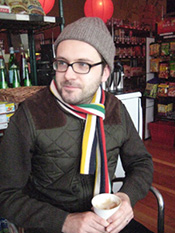Comments Section Gone Viral:
Lee Henderson in Conversation with Elyse Friedman

Malahat fiction board member Lee Henderson talks with Elyse Friedman about the role of social media in 21st century literature. Her story "Seventeen Comments" appears in the Summer 2016 issue; a humoristic take on a website's comments section, it explores how Internet users take advantage of online anonymity to scathe and troll others in the virtual world.
Read the full story posted online. After reading, we invite you to get into the spirit of the piece by adding a comment of your own about the story, or about the conversation it's inspiring.
Elyse Friedman is, most recently, the author of The Answer to Everything. She lives in Toronto.
So this is obviously a different kind of realism than the usual narrative naturalism—your story is a pretty funny but also pretty realistic appropriation of the look and feel of the comments thread of a website. When you write a story that takes on a voice like this—whether it's a comments thread or another non-literary form—how does this change the way you approach the development, revision, and completion of a piece?
My approach is always the same. The only difference in a piece with a borrowed format—in this case, a review followed by a series of comments—is that I didn't have to create the structure as I went along. The spine was already there, I just had to add the flesh. But it didn't make it any easier or harder to write, or change the way I wrote it. Everything else about the process was identical.
I want to ask what your opinion is of comments threads in general, but the answer is so obvious, that I want to ask you if you think there is some literary value to these stilted, often hateful dialogues, or if there is only literary value in the appropriation, that is, in the satirical?
There may well be literary value in some of the threads. Mine is written, but you could likely find some that could stand on their own as art pieces. You'd just have to frame them. Put the urinal on the wall, so to speak.
Social media is a relatively contemporary phenomenon and something writers are still grappling with, perhaps. I haven't seen a lot of fiction that deals directly with the impacts of social media on our lives. How has social media and the conversations you see on the internet changed the way you think about fiction?
Social media has become a part of my fiction because I write contemporary stories. It's such a huge part of everyday life; it would be unnatural if it weren't woven into stories that are set in the here and now. It was part of my last novel, The Answer to Everything, which was about an artist who starts a cult to make money. The cult used social media and a website to spread the good word and solicit funds. In my new novel, a man reconnects with a junior high school crush on Facebook, and a woman goes to peculiar lengths to seek refuge from the ubiquitous digital onslaught. In the latter example, the online world isn't just part of the story, it actually inspired the story—I sometimes feel overwhelmed by technology and try to run away from it.
The final refrain, in a word: "tired, tired, tired..." Is this a sentiment you share, at least when it comes to the dialogue you see online?
I don't feel that way generally. But I have felt that way. I felt it when I saw Leslie Jones attacked by racist trolls on Twitter, and a video by some fuckwit in Jasper whose Holocaust-denying rant has "gone viral."
Can you describe some of your habits as a person that help you as writer and what in your life remains a challenge?
What helps me as a writer: being curious about everything, being nosy (eavesdropping helps with dialogue). Plus, I truly enjoy writing, so I'll do it whenever I can. What remains a challenge: finding the time to write the things I want to write, earning enough money to support myself and my son.
I'm also curious about your writing process, and if you have any techniques you always use when taking an idea through the draft-work to get a piece to publishable state? Do you run your ideas by people at all stages of development?
Ideas usually arrive unbidden, and then get stashed in my subconscious for a while, sometimes years. The good ones tend to bubble up to get dealt with. I had the idea for "Seventeen Comments" about a year before I sat down to write it. When something is ready to come out it usually happens fairly fast (the best feeling in the world). And the first draft doesn't differ a whole lot from the final draft. I tend to write only a paragraph or two per day, and go over it again and again until the rhythm feels right. So by the time I get to the end, it's usually pretty close to the finished piece. I have three stories that I've been meaning to write for about a decade now, but they haven't come out yet.
I might share a concept for a story or a book with a close friend, usually a fellow writer, usually Gil Adamson. And I sometimes show drafts of works in progress, but not always. Sometimes the gas goes out of the thing if you share it too early.
Do you see unexpected gains for writing with the rise of social media? What are some of your favourite moments in Internet writing?
I suppose writers can have more eyeballs on stories thanks to social media. A while back I linked to a Facts and Arguments essay I'd written, and was surprised by how many times it was shared on Facebook. I don't think it's added up to any financial gains for writers though; if anything they're getting paid less for content. Fave moments in Internet writing: I enjoy the Tweets of @mrtimlong.
Have your ideas about what makes for good writing changed since you began publishing?
I don't think so. Talent is the most important ingredient. Then mix in as many of the following as you can: pain, loss, experience, intelligence, guts, sense of humour, empathy, soul, taste, fearlessness, originality, audacity, pizzazz. Craft is probably the least important part, though it's exciting when all the elements come together.
Is there a book or two that have helped you put the modern world into better perspective?
Every good book helps in its own way. The modern world is just the ancient world with more gadgets (and better teeth). I don't believe the human heart has changed very much.
What are you working on at the moment?
I'm excited to be writing my first play as part of the Tarragon Theatre's playwright's unit. I'm also working on a novel. And I have a book of short stories and a book of poems on the go. But most of my time is spent scrambling around, doing small freelance/screenwriting gigs to try to pay the rent. It's frustrating. I'd love to have the time to finish these projects. And start new ones.
* * * * * * * * *

Lee Henderson
Read all about fiction-board member Lee Henderson on the Malahat Staff page!









